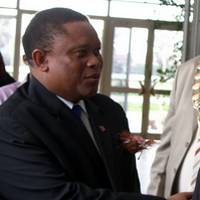-

 During his annual address to the fishing sector last week, the Minister of Fisheries and Marine Resources, Bernard Esau, revealed that the general economic outlook of the fishing industry had improved compared to the last three years. He acknowledged the fact that the fishing industry continued to experience a hangover due to the economic recession. “This after-effect was also exacerbated by the economic crisis experienced in Spain. However, it is worth noting that the market prices of some commercial fisheries have had an increase during 2010, while some fisheries had a decline. The exchange rate fluctuations and rising fuel prices have also affected Namibian fish exporters adversely. Sectors that have shown reduced prices during 2010 include horse mackerel, monk, rock lobster and hake. The crab and mariculture sectors on the other hand recorded better prices in 2010 compared to 2009.”
During his annual address to the fishing sector last week, the Minister of Fisheries and Marine Resources, Bernard Esau, revealed that the general economic outlook of the fishing industry had improved compared to the last three years. He acknowledged the fact that the fishing industry continued to experience a hangover due to the economic recession. “This after-effect was also exacerbated by the economic crisis experienced in Spain. However, it is worth noting that the market prices of some commercial fisheries have had an increase during 2010, while some fisheries had a decline. The exchange rate fluctuations and rising fuel prices have also affected Namibian fish exporters adversely. Sectors that have shown reduced prices during 2010 include horse mackerel, monk, rock lobster and hake. The crab and mariculture sectors on the other hand recorded better prices in 2010 compared to 2009.”
The minister also expressed his concern about the increase in labour disputes and strikes at fishing factories, adding that these types of incidents are “not conducive to the business environment in these difficult times that we find ourselves. I therefore would like to encourage fishing companies to be transparent with their employees and give employees feedback on the company’s performance on an annual basis.” He also expressed his concern over the increasing number of requests from hake right holders for conversions from wet fish quota to freezer quota. “The motivation for these requests usually hinges on financial difficulties, since freezer fish is more beneficial in terms of revenue generated as opposed to wet fish. The Ministry was also informed that some companies deliberately hold on to wet quota with the idea of converting later, shortly before the season ends. I would like to inform you that the 70/30 policy is a deliberate attempt to promote employment and value addition onshore, and the conversion is a direct reversal of that policy which the Ministry is trying to promote.”
Esau said the annual October closure of the hake fishing sector has proved to be useful in allowing hake stocks to recover from excessive fishing pressure and for spawning to take place undisturbed. However, he issued a stern warning to fishing companies that make themselves guilty of over-fishing and late payment of quota fees.
Walvis Bay’s Mayor, Derek Klazen, also addressed the gathering and referred to the current water dilemma faced by the city. “Namibia needs Walvis Bay to thrive in every respect. We can’t afford to survive on a trickle of water to run our city. We need water, lots of it, in order to grow our local economy and to strengthen our national economy, and we need to make sure that our systems are not held ransom by natural disasters, such as the destruction of water infrastructure caused by a flooding Kuiseb River. Therefore, as much as it is NamWater’s duty to ensure that our reservoirs are filled, and the Municipality’s duty to bring piped water to every home and business, it is also the nation’s duty, by way of central government, to assist these partners in securing an everlasting solution to this problem that cannot be wished away.” Minister Esau undertook to raise the city’s concerns at Cabinet level.